2023: a record-breaking year for global climate change
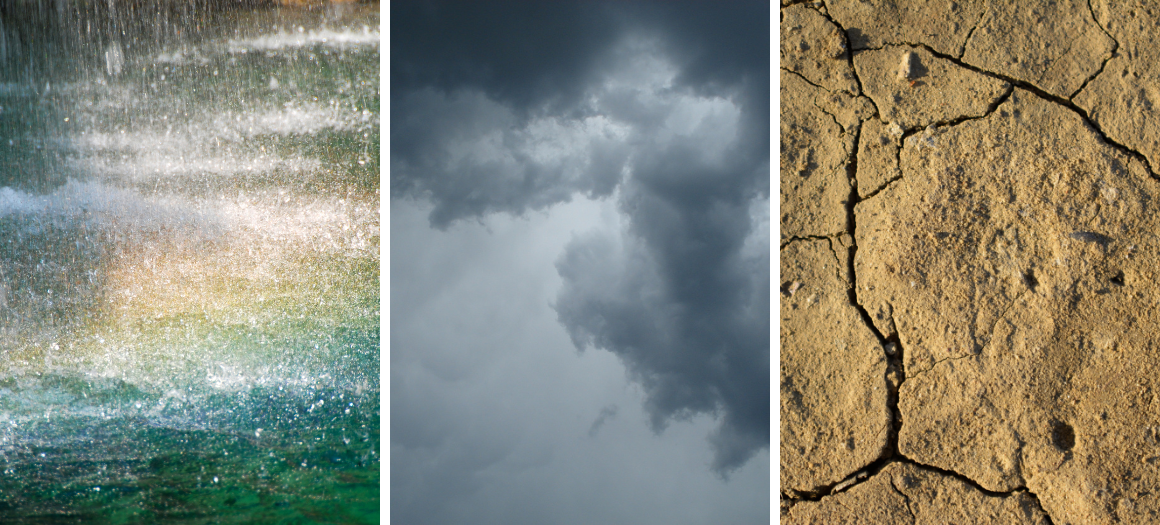
Tuesday 9 January 2024. The date that scientists confirmed 2023 as the hottest year since temperature records began (Fig.1). Furthermore, cores from the deep ocean and Antarctica mean that we can say with all likelihood that this has been the warmest year on earth in the past 125,000 years. To put that into perspective, the last time the earth was this warm, early humans had not yet left Africa, and the last Ice Age had not even begun.
According to the Copernicus Climate Change Service, and confirmed across the world by climate monitoring institutions such as NASA and the Met Office, the average global temperature in 2023 was 14.98°C, 0.17°C higher than the previous highest annual record in 2016 (Copernicus, 2024).
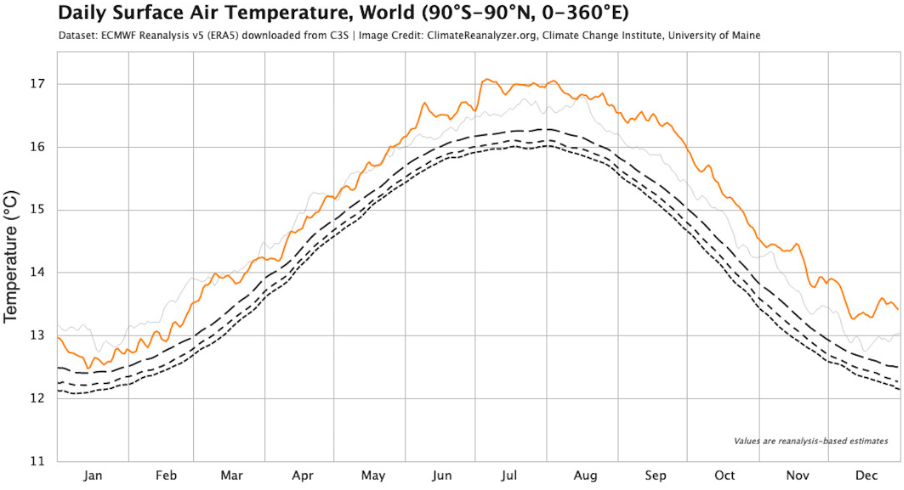
Figure 1: Orange Line: 2023, Grey Line: 2016, Dashes Lines (in ascending order): 1979-2002 average, 1981-2010 average, 1991-2020 average.
The impact of climate change on Earth
When compared to the pre industrialisation climate records (1850-1900) almost half of the days in 2023 were 1.5°C hotter, and for the first time ever two days were more than 2°C warmer. Overall 2023 was 1.48°C warmer than the pre industrial period, meaning in 2024 we will most likely fail to limit global warming to no more than 1.5°C, the target set in the landmark Paris Agreement in 2015 (United Nations, 2015).
The impact of rising temperatures on earth has long been debated, in academia, politics and everyday conversations. With each passing year the answers become clearer. High temperatures have driven heatwaves, droughts, storms, floods, and wildfires across the globe. This is the end result of climate warming: extreme weather events are occurring more often and becoming more intense.
The causes of rising temperatures
There are a host of natural conditions, such as changes to the earth’s orbit around the sun, variations in solar activity, and volcanic eruptions which can change the earth’s climate. We are also contending with the El Niño Southern Oscillation, a natural climatic phenomenon which in short, results in warmer global temperatures, was confirmed to have begun in summer 2023, and will continue into 2024.
BUT, there is one oily elephant in the room. Global carbon dioxide emissions in 2023 were the highest on record, up 1.1% from 2022 (Global Carbon Budget, 2023). This is no coincidence, and by now much of the world knows it (Fig. 2). Despite this, the president of COP 28 (the main decision-making body of the United Nations on Climate Change) said there is ‘no science’ behind demands to phase-out fossil fuels (Carrington & Stockton, 2023). Could it be that Dr Sultan al-Jaber knows something that the 97% of actively publishing climate scientists who agree fossil fuels are driving climate warming don’t? Or does Dr Sultan al-Jaber also being the CEO of the Abu Dhabi National Oil Company (the 12th largest exporter of oil in the world) have something to do with it?
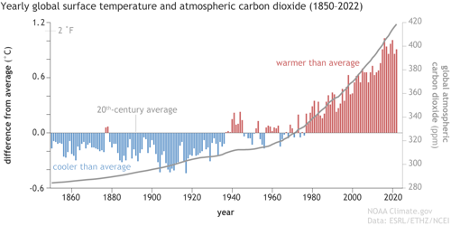
Figure 2: Yearly temperature compared to the twentieth-century average (red bars mean warmer than average, blue bars mean colder than average) from 1850–2022 and atmospheric carbon dioxide amounts (grey line) (NOAA, 2022).
The average yearly global temperature record being broken by 0.17°C may not sound like a lot but, in terms of climate, it is a huge increase. A better way of putting this into perspective, is looking at some of the smaller climate anomalies and extreme weather events which have taken place across the globe.
Below is a list of just a fraction of records broken this year, but illustrates the truly global scale of climate change:
Air Temperature
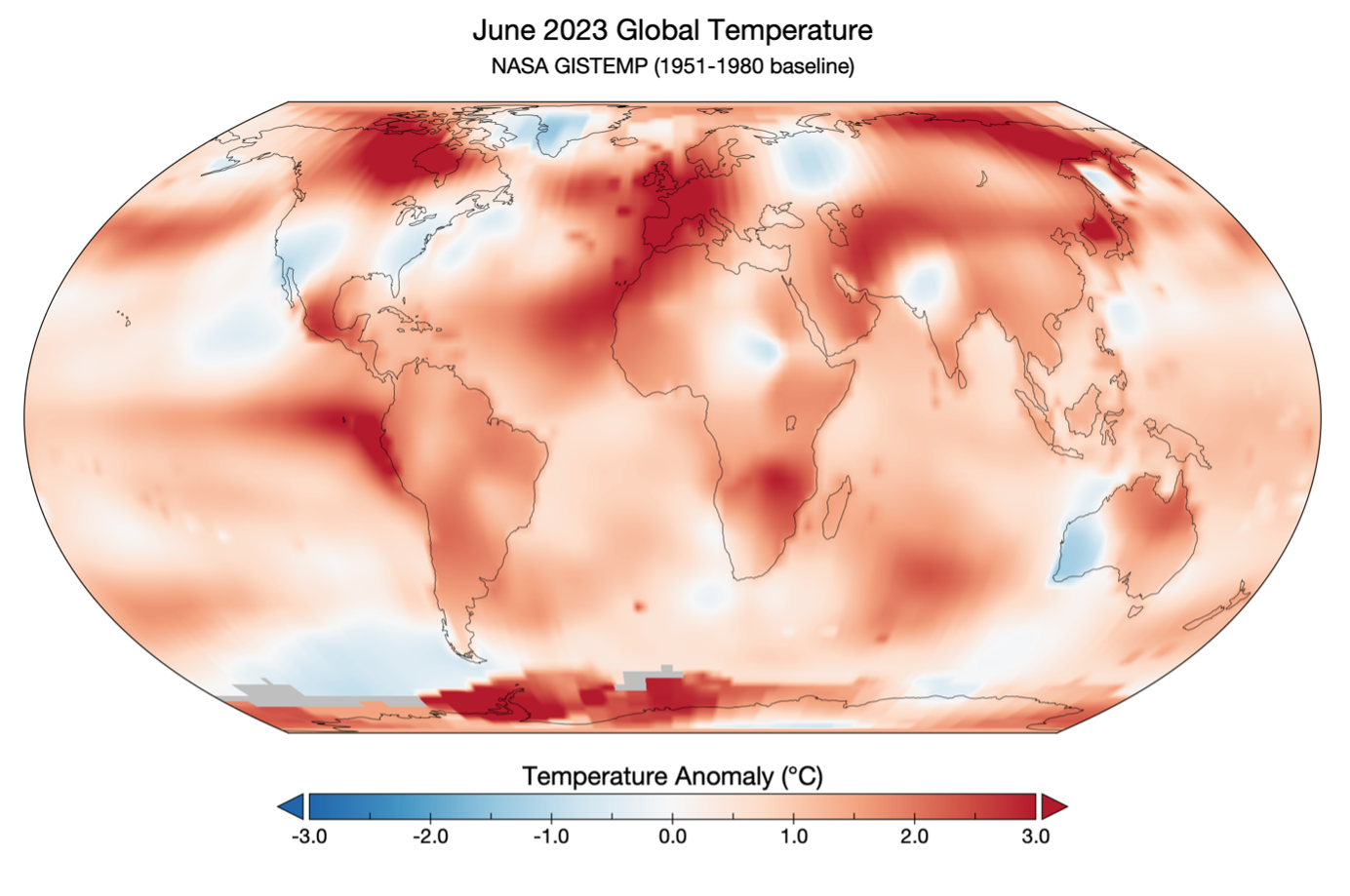
Temperature anomalies recorded in June 2023, the hottest month on earth in the past 125,000 years. Credit: NASA
- Boreal summer (June-August) was the warmest ever recorded.
- July and August 2023 were the 2 hottest months ever recorded.
- Each month from June to December 2023 was warmer than the corresponding month in any other year.
- Earth recorded its hottest ever day 4 days in a row between the 3rd and the 6th of July 2023
- Brazil, Peru, Guyana, Turkey, Morocco, Albania, China, Hong Kong, Chad, Vietnam, Laos and Thailand all recorded their highest ever temperatures in 2023.
Ocean temperatures
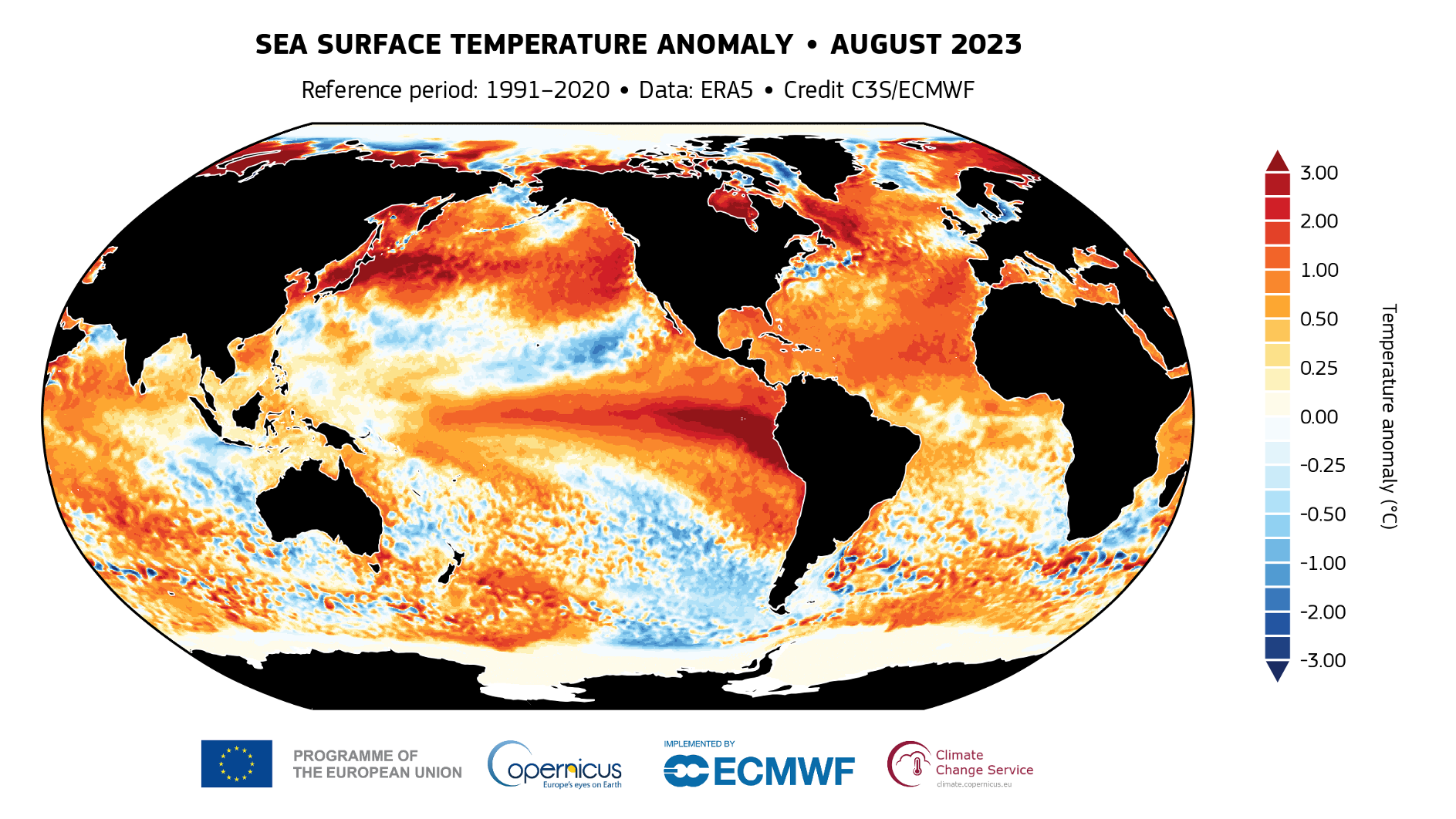
Record global sea surface temperature anomalies in August 2023. Credit: Copernicus
- Highest global sea surface temperature (SST) ever recorded (21.02°C) on the 23rd and 24th of August 2023
- Every month from April through to December 2023 saw record global SST for each corresponding month.
- Global sea ice extent was the 2nd lowest ever recorded.
- Antarctic sea ice reached its lowest ever extent.
Natural disasters
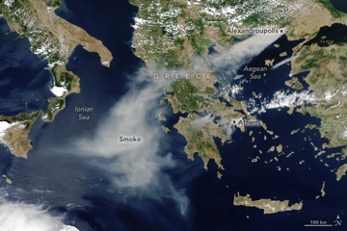
Wildfire smoke from Greece can be seen from space on August 22nd, 2023. Credit: NASA
- A record 45.7m acres of forest (roughly twice the size of Portugal) was burned in Canadian wildfires. The average annual burn is just 2.5m acres.
- Greece experienced the largest wildfire ever recorded in the EU.
- A record 28 billion-dollar weather and climate disasters were recorded in the US.
- Cyclone Freddy was the longest hurricane ever recorded, lasting for 37 days and killing 140 people eastern Africa.
Climate change in the UK
When compared to much of the rest of the world, we got off lightly in terms of extreme climate events in 2023 (It was only the 2nd hottest year ever recorded (behind 2022) and just the 11th wettest in the past 167 years) but trends confirm many UK climatologists’ warnings that climate change is making the UK warmer and wetter.
Winter storms are becoming more commonplace and intense. The warmer winter temperatures means that the atmosphere can hold greater amounts of water vapour, and when it does rain, it will be heavier, more likely to lead to flooding and pollution being discharged into our rivers. The UK has already been battered by storms Babet, Ciarán, Debi, Elin, Fergus and Gerrit in the tail end of 2023, and storms Henk, Isha and Jocelyn have swiftly followed so far this year. This is our new normal.
Climate warming is making extreme weather events in the UK more common and it begs the question of whether they should even be considered as exceptional, or rather just a new normal part of our climate due to atmospheric warming (Dong et al., 2013; Feser et al., 2015; Priestley & Catto, 2022). In turn, these climate changes question the validity of regulatory measures such as those for sewage pollution. Currently water companies are allowed to discharge untreated sewage into our rivers only in ‘extreme weather’ (WildFish, 2023) but, how do we now define ‘extreme weather’?
The impact of climate change on wild fish
Here at WildFish, we are concerned about how climate change is impacting our aquatic wildlife. Whether this is of personal interest or not, we should all be very concerned about the state of our waterways under climate change. The Intergovernmental Panel on Climate Change (IPCC) has made it very clear:
Water is the primary medium through which we feel the impacts of climate change.
United Nations
2016
Over 90% of all disasters are water related, and over 40% of the world’s population are affected by water scarcity. The earth is already incredibly water stressed (Fig. 3). Even the UK, which we think of as having an abundance of water, is rapidly depleting freshwater resources such as groundwater, which in human timescales is becoming very much a finite resource.
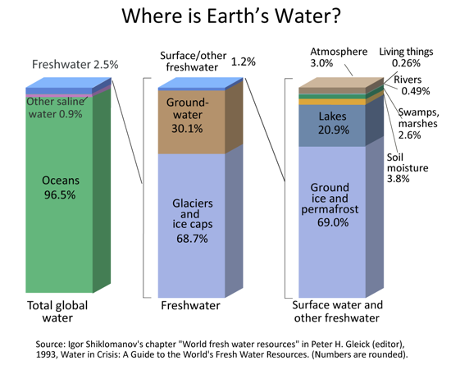
Figure 3: Distribution of world’s freshwater resources by percentage.
A declining freshwater environment
Much like melting ice caps are symptomatic of global warming, declining aquatic wildlife is indicative of the deterioration of our waters ecologically, chemically, and hydrologically. We should be thinking about the declining quality of water in the UK as the canary in a coalmine. Rising ocean and freshwater temperatures result in:
1. Stratification which reduces the mixing of deeper nutrient rich waters with the surface layer, starving plankton, a keystone species on which many aquatic organisms rely.
2. Increased risk of deoxygenation and eutrophication in freshwater ecosystems.
3. Fish mortality: in 2023 we saw unprecedented mass fish mortality events across the UK, especially in the summer months where record ocean heat waves were observed.
4. Increases in sea lice which have been found to infect both farmed and wild salmon more effectively at higher temperatures (Dalvin et al., 2020). Record mortality figures were reported on Scottish salmon farms last year.
5. Changes to aquatic invertebrates reproductive cycles and reductions in habitat range (Bennett, 2007; Macadam et al., 2022).
Much in the same way climate change is spurring mass human migration to cooler climates, the same is happening in our oceans and rivers. However, here there are no international borders to mitigate the flow of migrants; if waters become too warm, fish species will either leave or die. This phenomenon is known as the ‘escalator effect’ where many animal species, both terrestrial and aquatic, are moving to higher latitudes or altitudes to escape rising temperatures (Marris, 2007).
The question is what will happen to those already at the top of the escalator? Those in freshwater will migrate upstream until there is nowhere else to go, and those in saltwater will migrate towards the poles. What happens then? We have to assume they ‘fall off’ the top of the escalator and become extinct.
Human-induced climate change
Scientists are debating if the Earth has entered its 6th mass extinction but, unlike any previously, a single species is causing it – humanity. Some estimates have suggested that biodiversity is declining at a rate faster than the last mass extinction at the end of the Cretaceous Period 65 million years ago, which wiped out the dinosaurs (Raven et al., 2011).
Our aquatic wildlife is on the frontline in the battle against climate change. 25% of the world’s freshwater species are now at risk of extinction, and the Atlantic Salmon, perhaps the UK’s most iconic fish species, has now been reclassified on the IUCN Red List as endangered with global populations near threatened (WWF, 2023). As more unprecedented heat – like those in – 2023 will undoubtedly follow, it is critical that we continue to monitor and protect our lakes, rivers, and seas in the UK.
You can read more about the record breaking climate change in 2023 from some of the global climate organisations responsible for monitoring our changing climate linked below.
National Oceanic and Atmospheric Administration (NOAA)
Copernicus Climate Change Service (EU)
List of references
Bennett, C. (2007). A seven year study of the life cycle of the Mayfly Ephemera danica. Freshwater Forum, 27, 3–14.
Carrington, D., & Stockton, B. (2023, December 3). Cop28 president says there is ‘no science’ behind demands for phase-out of fossil fuels. The Guardian. https://www.theguardian.com/environment/2023/dec/03/back-into-caves-cop28-president-dismisses-phase-out-of-fossil-fuels
Copernicus. (2024). Global Climate Highlights 2023. https://climate.copernicus.eu/global-climate-highlights?utm_source=press&utm_medium=referral&utm_id=gch23
Dalvin, S., Are Hamre, L., Skern-Mauritzen, R., Vågseth, T., Stien, L., Oppedal, F., & Bui, S. (2020). The effect of temperature on ability of Lepeophtheirus salmonis to infect and persist on Atlantic salmon. Journal of Fish Diseases, 43(12), 1519–1529. https://doi.org/10.1111/jfd.13253
Dong, B., Sutton, R. T., Woollings, T., & Hodges, K. (2013). Variability of the North Atlantic summer storm track: Mechanisms and impacts on European climate. Environmental Research Letters, 8(3), 034037. https://doi.org/10.1088/1748-9326/8/3/034037
Feser, F., Barcikowska, M., Krueger, O., Schenk, F., Weisse, R., & Xia, L. (2015). Storminess over the North Atlantic and northwestern Europe—A review. Quarterly Journal of the Royal Meteorological Society, 141(687), 350–382.
Global Carbon Budget. (2023). Fossil CO2 emissions at record high in 2023. Global Carbon Budget. https://globalcarbonbudget.org
Macadam, C. R., England, J., & Chadd, R. (2022). The vulnerability of British aquatic insects to climate change. Knowledge & Management of Aquatic Ecosystems, 423, Article 423. https://doi.org/10.1051/kmae/2022003
Marris, E. (2007). The escalator effect. Nature Reports Climate Change, 1, 94–96.
NOAA. (2022). What evidence exists that Earth is warming and that humans are the main cause? http://www.climate.gov/news-features/climate-qa/what-evidence-exists-earth-warming-and-humans-are-main-cause
Priestley, M. D. K., & Catto, J. L. (2022). Future changes in the extratropical storm tracks and cyclone intensity, wind speed, and structure. Weather and Climate Dynamics, 3(1), 337–360. https://doi.org/10.5194/wcd-3-337-2022
Raven, P. H., Chase, J. M., & Pires, J. C. (2011). Introduction to special issue on biodiversity. American Journal of Botany, 333–335.
United Nations. (2015). The Paris Agreement | UNFCCC. https://unfccc.int/process-and-meetings/the-paris-agreement
United Nations. (2019). UN-Water Side Event: Climate-resilient Water Management Approaches. Department of Economic and Social Affairs; United Nations. https://www.un.org/en/desa/un-water-side-event-climate-resilient-water-management-approaches
WildFish. (2023, February 14). WildFish granted permission to challenge the Government’s Sewage Overflows Plan. Wildfish News. https://wildfish.org/latest-news/wildfish-granted-permission-to-challenge-the-governments-sewage-overflows-plan/
WWF. (2023). Freshwater fish, including Atlantic Salmon, face extinction crisis: EU Nature Restoration Law. https://www.wwf.eu/?12476341/Freshwater-fish-including-Atlantic-Salmon-face-extinction-crisis-EU-Nature-Restoration-Law-urgently-needed


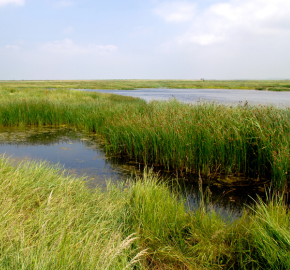
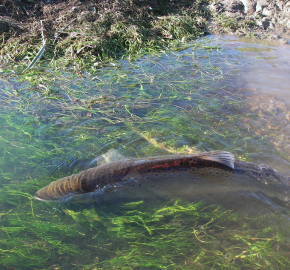

[…] our wealth, They’re like the puppeteers of the atmosphere, pulling strings left and right. With climate change potentially cranking its impact up to eleven, we must keep our eyes peeled on their every move. […]